Lithium Ion Battery recycling.
Lithium-ion batteries are rechargeable batteries that are commonly used in electronic devices such as smartphones, laptops, and electric vehicles. They consist of several components, including a cathode, an anode, a separator, and an electrolyte, which contains lithium ions. These components can be recycled, and recycling can help reduce the environmental impact of battery production and disposal.
Lithium-ion battery recycling typically involves several steps. First, the batteries are collected and sorted according to their chemistry and capacity. Then, the batteries are disassembled and the individual components are separated. This can be done using mechanical, chemical, or thermal processes.
Once the components are separated, they can be processed and purified. For example, the cathode and anode materials can be recovered and used to make new batteries. The electrolyte can be treated and reused, and the metal foils can be recycled.
Recycling lithium-ion batteries has several benefits. It helps reduce the environmental impact of battery production and disposal by conserving natural resources and reducing greenhouse gas emissions. Recycling also helps reduce the risk of fires and explosions, which can occur when batteries are improperly disposed of.
However, lithium-ion battery recycling is still a relatively new industry, and there are several challenges to overcome. For example, not all types of batteries are currently recyclable, and the recycling process can be expensive. In addition, there is currently a lack of standardized recycling methods, which can make it difficult to scale up the industry.
Overall, lithium-ion battery recycling is an important step towards a more sustainable and environmentally friendly future. As the demand for lithium-ion batteries continues to grow, it is essential to develop efficient and cost-effective recycling methods to ensure that the resources used to produce these batteries are conserved and reused.
For consulting support in Lithium ion battery recycling for R2 V3 certification, NAID certification by NAID if Data devices are being handled in Singapore, Philippines, Malaysia, Indonesia contact [email protected] or [email protected]


